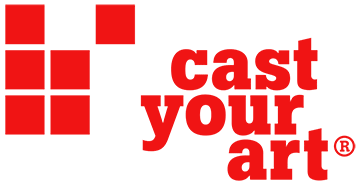Michael Maier - Witch Kitchen
Sometimes, he feels physically compelled. But if force is necessary in order to be able to begin, his painting is still not—as one would be inclined to believe—self-therapy. To successfully summon the spirit, to breed expression out of a situation, to capture the feeling that is borne from a life experience, and then to carry it over to the work, does not necessarily happen each time. If this is the case, one must abruptly stop before one begins, and in a few days, start fresh, exposing oneself anew—as he would put it.
The path to painting leads the painter Michael Maier over a threshold. When he passes it, he finds himself in a kind of “witch kitchen”, in which he brews his art concoctions and breaks down the borders of our world of values. In the artistic act, he becomes emotionally and physically one with his work. His works erupts forth out of himself.
They come into being in rapid, sometimes destructively creative acts. Afterwards, he is often surprised about what he has given birth to. The feat is exhaustive. Only a few hours a day, and then he must stop. He does not wish to live with this emotionality the entire day, as he says. One must portion it out—he cannot manage more than that.
The emphasis of Maier’s artistic work lies in painting, for which his work with sculptures prepares him. Through the sculptural work, he collects his thoughts. Even when he works with easily moldable PU-foam, this activity is slower, a chance to compose himself, in order that he can start again with the painting. In his painting, Maier finds himself in battle with all living as well as dead artists. He extracts from them his own conception of what an artist is and how an artist should be. They provoke him and act as his models and catalysts, in particular, Bacon, de Kooning, and Rebeyrolle.
When Michael Maier leaves the studio, he leaves the painter behind. One must also be the businessman in order to survive in the art world—to believe otherwise would be naive. However, the intensity of artistic struggle has its lasting effect. Normality, he says, somehow often seems strange thereafter. His work can perhaps act as a form of meditation. It can be his assurance that today is today and that now is now—a liberating opportunity to create something, without being hindered by the future or the past. (wh/jn)
Das könnte Sie auch interessieren

VAN GOGH, CÉZANNE, MATISSE. The Hahnloser Collection
15. September 2020
THE BEGINNING. Art in Austria, 1945-1980. #4 Abstract Art
18. June 2020
MARTHA JUNGWIRTH. A retrospective at Albertina Museum
23. April 2018
Füsun Onur - Silent Music
24. September 2008
ERWIN WURM. School
25. September 2024
TONY CRAGG. Sculpture: Body and Soul (Part 2)
2. August 2022
FRANZ SEDLACEK. Winter Landscape. A picture review by Gottfried Helnwein
2. January 2021
